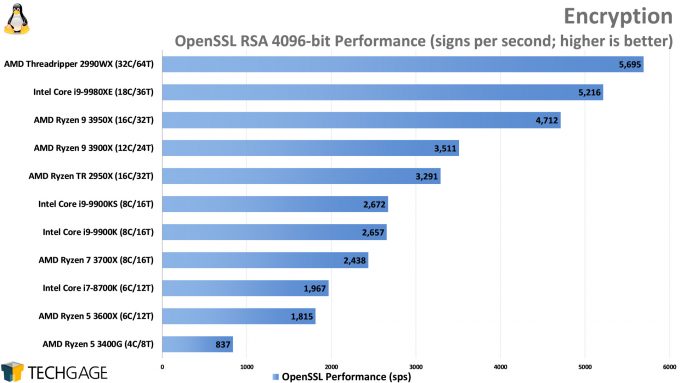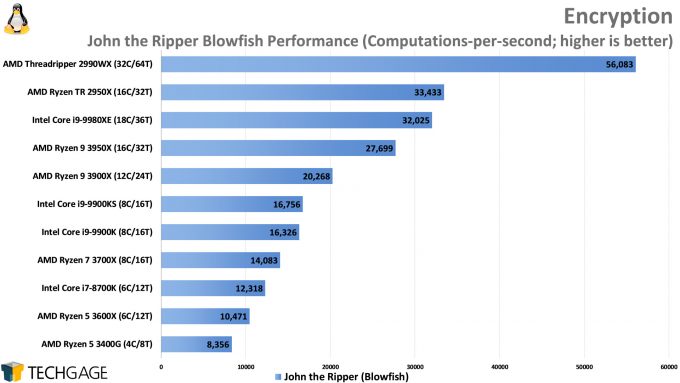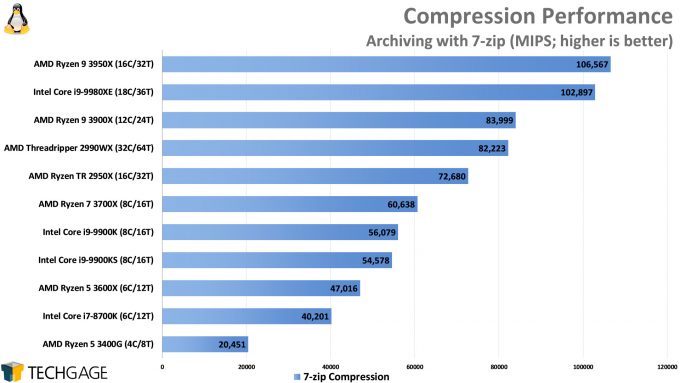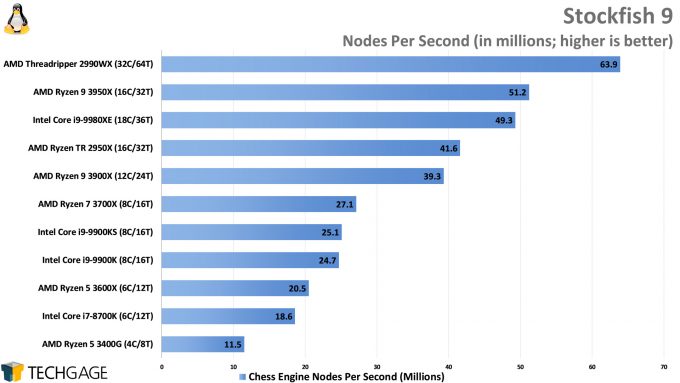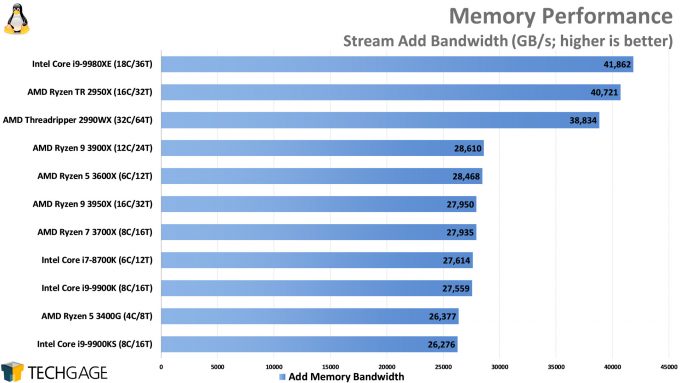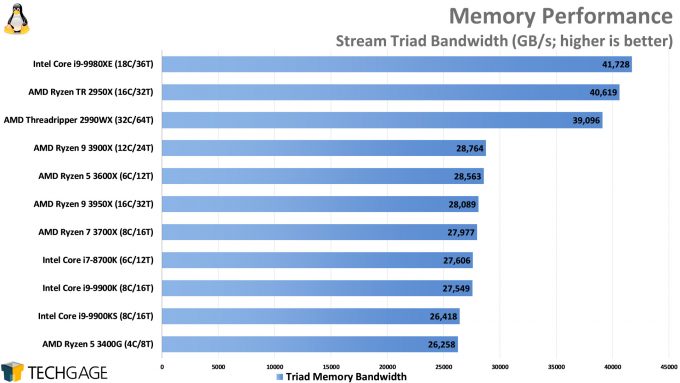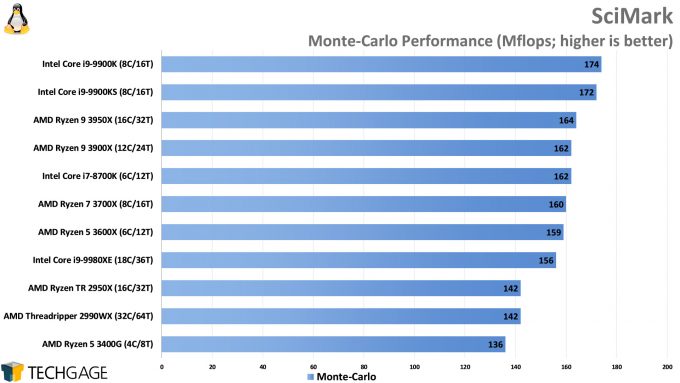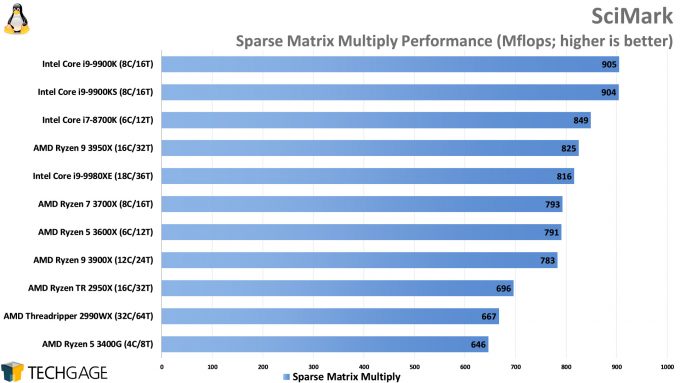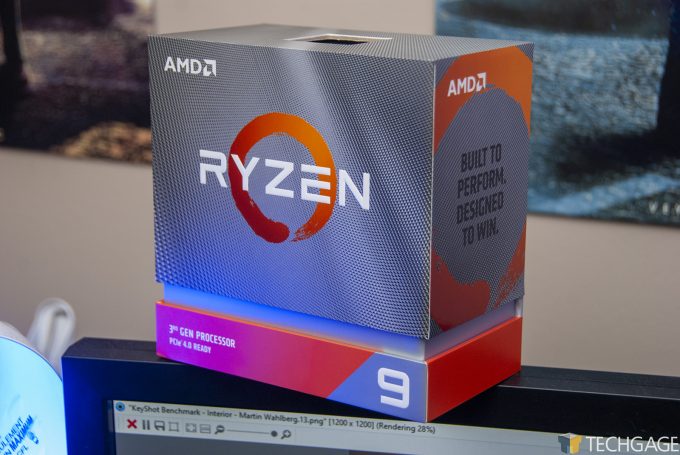- Qualcomm Launches Snapdragon 4 Gen 2 Mobile Platform
- AMD Launches Ryzen PRO 7000 Series Mobile & Desktop Platform
- Intel Launches Sleek Single-Slot Arc Pro A60 Workstation Graphics Card
- NVIDIA Announces Latest Ada Lovelace Additions: GeForce RTX 4060 Ti & RTX 4060
- Maxon Redshift With AMD Radeon GPU Rendering Support Now Available
A Linux Performance Look At AMD’s 16-core Ryzen 9 3950X

With so many CPUs hitting the market this month, it was time to both retest our collection of chips and update our tests. In this article, we’re going to be covering a bunch of workloads in Linux, ranging from compiling to rendering, compute to encryption. AMD’s new 16-core Ryzen 9 3950X joins ten other processors, so let’s see how it stacks up.
Page 3 – Encryption, Compression & Memory Performance; Final Thoughts
The previous pages have been focused on specific scenarios, like science, rendering, and compiling, so to wrap things up, this page is going to revolve around some more general scenarios, like encryption, compression, and memory bandwidth. For good measure, a chess engine even makes an appearance.
We’ve been lacking more single-threaded tests in the past, but have introduced some SciMark-sourced ones here. We’re still not sure if they are ideal, but they serve the purpose for now. As always, if you have a suggestion of another test we should implement, please leave a comment.
Encryption Performance
With the OpenSSL test, Intel has some strong numbers against AMD’s equal-core competition. Even at the top-end, the 18-core 9980XE doesn’t shy that far away from the 2990WX. Both of those chips are in good company, as the 3950X sits just behind them. With the blowfish result, we’re seeing a great example of core efficiency. In that test, memory bandwidth also seems to count for something, since the 16-core 2950X manages to beat out the current-gen 3950X.
7-zip Compression Performance
With 7-zip compression, AMD’s 16-core 3950X once again manages to climb to the top, beating out Intel’s 18-core 9980XE. We’d imagine that Intel’s upcoming 10980XE might match the performance, but do so at a cost of about $250 more. We’re really keen on seeing how Threadripper third-gen scales here, since the second-gen doesn’t fare too well.
Addendum: The following paragraph was originally posted here, but was likely incorrectly referring to another graph, due to its nonsensical points. “Here’s an interesting result. The 3950X has defied all core-count logic to sit at the top, ahead of the Intel 18-core chip. Core for core, Intel seems to have an advantage, thanks in part to the fact that the 2990WX didn’t scale as well as it should have. This disparity could come down to the better cache handling of the Zen 2 architecture, plus the extensive cache reserve for the dictionary in the third-gen Ryzens. We can’t get third-gen Threadripper prospects off the mind (and at this point, we’re so close to launch.)”
Chess Engine Performance
Chess engines exploit many-core processors extremely well, with scaling from the bottom to the top agreeing with our expectations. There are some exceptions, though, such as how the AMD six-core beat out the Intel six-core, but the same couldn’t be said for the eight-cores. Meanwhile, the 18-core 9980XE puts up a good fight, but the 3950X’s a bit stronger.
Memory Bandwidth
The Intel X299 and AMD X399 platforms make it obvious that a quad-channel memory controller is going to dramatically increase the amount of bandwidth you have to play with. Across both tests, Intel proved the victor. For the dual-channel platforms, performance doesn’t change too much across the stack. If you need a quad-channel memory controller, you’ve surely run into memory limitations with your work already.
Single Threaded Performance
We haven’t found what we feel to be an ideal set of single-threaded tests yet, and by saying that, we’re not implying that they’re inherently important. Sometimes, stronger IPC comes through in other test results, when two equal core count parts show significant performance deltas. With these tests, Intel has a clear advantage, thanks to their high Turbo clock speeds, with even the 8700K placing third place in the matrix-multiply test. Overall, and returning to the subject at hand, the 3950X performs great overall here, with huge gains seen over the previous Zen generation.
Final Thoughts
After poring over all of these test results, it’s easy to draw the conclusion that AMD’s Ryzen 9 3950X is a ridiculously powerful processor, and an especially good value for the price. We haven’t seen what Intel’s 18-core i9-10980XE can do, but as far as we understand it, it’s a modest iteration over the 9980XE, and in many cases, the 3950X edged that out pretty easily. The kicker? The 3950X is $749 – or $250 less than the 10980XE. Intel is dealing with some seriously strong competition right now.
As great as the 3950X is, it’s not meant for everyone. A regular end-user is not likely to use anywhere near 16 cores on a regular basis, or perhaps ever. If you don’t run workloads that will actually take advantage of as many cores as you throw at it, the 3950X shines as an amazing multi-tasking processor.
AMD really knows that it has a great portfolio with Zen 2. That’s leading to things like the upcoming 32-core costing a couple of hundred dollars more SRP than last-year’s 32-core. Last year’s architecture had some flaws, mostly on the Threadripper side, but this generation seemingly makes those flaws a thing of the past. If our upcoming Threadripper performance look scales as well as we hope it will, we’re going to see some truly interesting numbers.
Really, for the price-points of each chip, AMD is offering a really strong value with the 8-core 3700X, 12-core 3900X, and 16-core 3950X. What you end up going for will depend on how much breathing room you need, for either multi-tasking or more intensive workloads.
Support our efforts! With ad revenue at an all-time low for written websites, we're relying more than ever on reader support to help us continue putting so much effort into this type of content. You can support us by becoming a Patron, or by using our Amazon shopping affiliate links listed through our articles. Thanks for your support!




